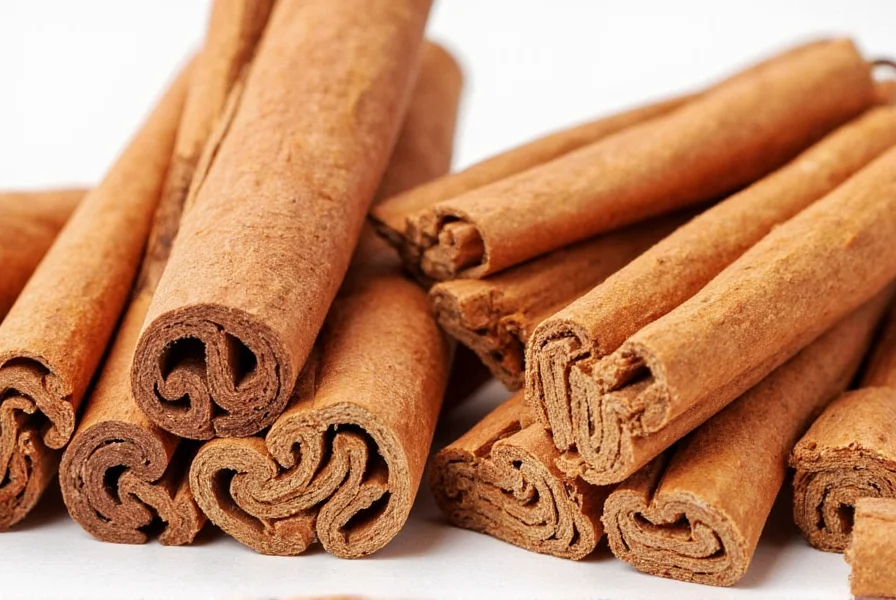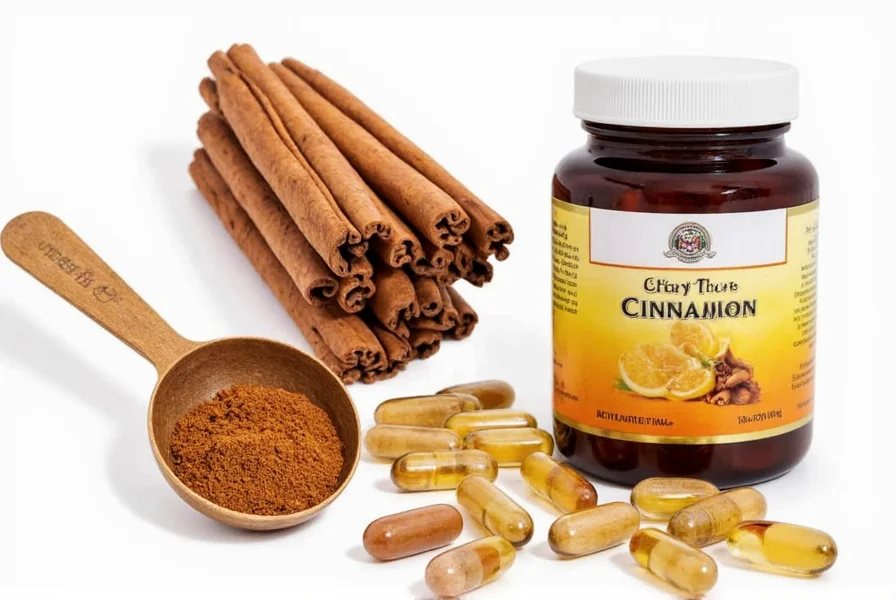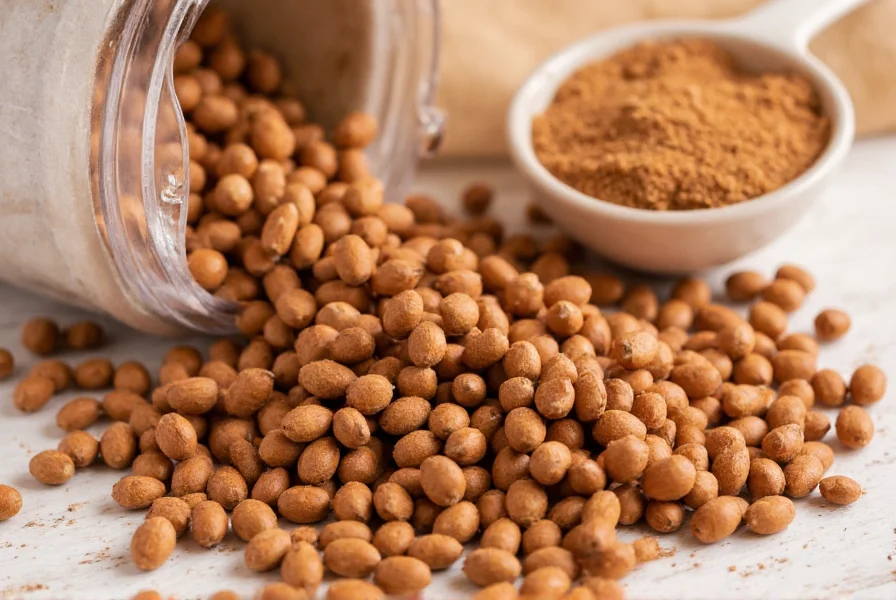Ceylon cinnamon (Cinnamomum verum), often called "true cinnamon," has gained attention as a safer alternative to the more common Cassia cinnamon for supplement use. The primary distinction lies in coumarin content—a naturally occurring compound that can cause liver damage in high doses. While Cassia cinnamon contains 1-5% coumarin by weight, Ceylon cinnamon typically contains only 0.004-0.05%, making it the preferred choice for regular supplementation.
Understanding Ceylon vs. Cassia Cinnamon
Many consumers don't realize that most cinnamon sold in supermarkets is actually Cassia cinnamon (Cinnamomum cassia), not Ceylon. The visual differences are subtle but important:
| Characteristic | Ceylon Cinnamon | Cassia Cinnamon |
|---|---|---|
| Origin | Sri Lanka, India, Madagascar | China, Indonesia, Vietnam |
| Bark Layers | Multiple thin, delicate layers | One thick, hard layer |
| Color | Light tan to medium brown | Dark reddish-brown |
| Taste | Milder, sweeter, more complex | Stronger, more intense, slightly bitter |
| Coumarin Content | 0.004-0.05% | 1-5% |
Scientifically Supported Health Benefits
Research on ceylon cinnamon supplements reveals several potential health benefits, though evidence varies in strength:
Blood Sugar Regulation
A 2015 meta-analysis published in the Journal of the Academy of Nutrition and Dietetics found that cinnamon supplementation (1-6 grams daily) significantly reduced fasting blood glucose levels. Ceylon cinnamon specifically shows promise for improving insulin sensitivity, though most studies used Cassia. The active compounds, including cinnamaldehyde and polyphenols, appear to enhance glucose uptake by cells.
Antioxidant Properties
Ceylon cinnamon ranks among the most antioxidant-rich spices. A study in Oxidative Medicine and Cellular Longevity (2018) demonstrated its high ORAC (Oxygen Radical Absorbance Capacity) value, indicating strong free radical scavenging ability. These antioxidants help combat oxidative stress, which contributes to chronic disease development.
Anti-inflammatory Effects
Research in Nutrition Research (2020) showed that ceylon cinnamon extract reduced inflammatory markers like TNF-α and IL-6 in human cell studies. Chronic inflammation underlies many health conditions, making this property potentially valuable for long-term health maintenance.
Safety Considerations and Coumarin Content
The European Food Safety Authority (EFSA) established a tolerable daily intake (TDI) of 0.1 mg coumarin per kilogram of body weight. For a 70 kg (154 lb) adult, this equals 7 mg daily.
Consuming just 1-2 teaspoons of Cassia cinnamon can exceed this limit, while Ceylon cinnamon would require consuming 30-50 times that amount to reach the same coumarin level. This makes ceylon cinnamon supplements significantly safer for regular, long-term use—particularly important for individuals with liver conditions or those taking medications metabolized by the liver.

Choosing Quality Ceylon Cinnamon Supplements
Not all products labeled as Ceylon cinnamon contain authentic Cinnamomum verum. Consider these factors when selecting supplements:
- Third-party testing: Look for products verified by independent labs like USP, NSF, or ConsumerLab
- Species identification: Ensure the label specifies Cinnamomum verum or Cinnamomum zeylanicum
- Coumarin testing: Premium products may include coumarin content on the label
- Extraction method: Water-based extracts typically contain less coumarin than alcohol-based extracts
- Standardization: Some products standardize to specific compounds like cinnamaldehyde (1-3%)
Recommended Dosage Guidelines
Research suggests effective ceylon cinnamon supplement dosage recommendations typically range from 500 mg to 2,000 mg daily, divided into 1-2 doses. Most clinical trials showing blood sugar benefits used 1,000-1,500 mg daily.
Unlike Cassia cinnamon, Ceylon can generally be taken daily without coumarin-related concerns. However, individual responses vary, so starting with a lower dose (500 mg) and monitoring your body's response is advisable. Consult with a healthcare provider before beginning supplementation if you have liver conditions or take medications.

Potential Medication Interactions
Ceylon cinnamon supplements may interact with certain medications, though research is limited. Potential concerns include:
- Diabetes medications: May enhance blood sugar-lowering effects, potentially causing hypoglycemia
- Liver-metabolized drugs: Though lower risk than Cassia, high doses could theoretically affect liver enzymes
- Blood thinners: Cinnamon contains vitamin K, which may affect anticoagulant medications
Always discuss supplement use with your healthcare provider, especially if taking prescription medications or managing chronic health conditions.
Evidence-Based Recommendations
Based on current research, ceylon cinnamon supplements appear most beneficial for:
- Individuals seeking natural support for blood sugar management
- Those wanting antioxidant protection in their daily regimen
- People needing a safer long-term cinnamon option compared to Cassia
- Individuals with mild inflammation concerns
It's important to maintain realistic expectations—cinnamon supplements work best as part of a comprehensive health approach including proper diet, exercise, and medical care when needed. They're not a replacement for prescribed medications for conditions like diabetes.
Frequently Asked Questions
How much coumarin is in Ceylon cinnamon compared to Cassia?
Ceylon cinnamon contains only 0.004-0.05% coumarin by weight, while Cassia cinnamon contains 1-5%. This means you would need to consume 30-50 times more Ceylon cinnamon than Cassia to reach the same coumarin level. For reference, 1 teaspoon of Cassia cinnamon contains approximately 5-15 mg of coumarin, while the same amount of Ceylon contains only 0.01-0.05 mg.
Can I take Ceylon cinnamon supplements every day?
Yes, ceylon cinnamon supplements are generally considered safe for daily use at recommended doses (500-2,000 mg). Unlike Cassia cinnamon, the extremely low coumarin content in Ceylon makes it suitable for regular, long-term consumption without significant liver risk. However, if you have liver conditions or take medications, consult your healthcare provider before starting daily supplementation.
What's the most effective dosage of Ceylon cinnamon for blood sugar control?
Research suggests 1,000-1,500 mg of ceylon cinnamon daily provides the most consistent benefits for blood sugar regulation. A 2013 study in the Nutrition Journal found 1,000 mg daily significantly improved fasting blood glucose after 12 weeks. For best results, divide the dose (500 mg twice daily) and take with meals. Individual responses vary, so monitoring your blood sugar levels is recommended when starting supplementation.
How can I verify if my cinnamon supplement is genuine Ceylon cinnamon?
Look for products that specify Cinnamomum verum or Cinnamomum zeylanicum on the label, not just "Ceylon cinnamon." Reputable brands often include third-party testing verification (USP, NSF, ConsumerLab) and may provide coumarin content information. You can also examine the physical product—authentic Ceylon cinnamon forms multiple thin, papery layers that crumble easily, unlike the single thick, hard layer of Cassia. Some premium supplements include DNA testing verification for species identification.
Are there any side effects of Ceylon cinnamon supplements?
Ceylon cinnamon supplements are generally well-tolerated at recommended doses. Some people may experience mild digestive upset or mouth irritation. Unlike Cassia cinnamon, liver concerns are minimal due to the extremely low coumarin content. However, cinnamon contains coumarin compounds even in small amounts, so extremely high doses (above 5,000 mg daily) could potentially cause issues for sensitive individuals. As with any supplement, discontinue use if you experience adverse reactions and consult a healthcare provider.











 浙公网安备
33010002000092号
浙公网安备
33010002000092号 浙B2-20120091-4
浙B2-20120091-4